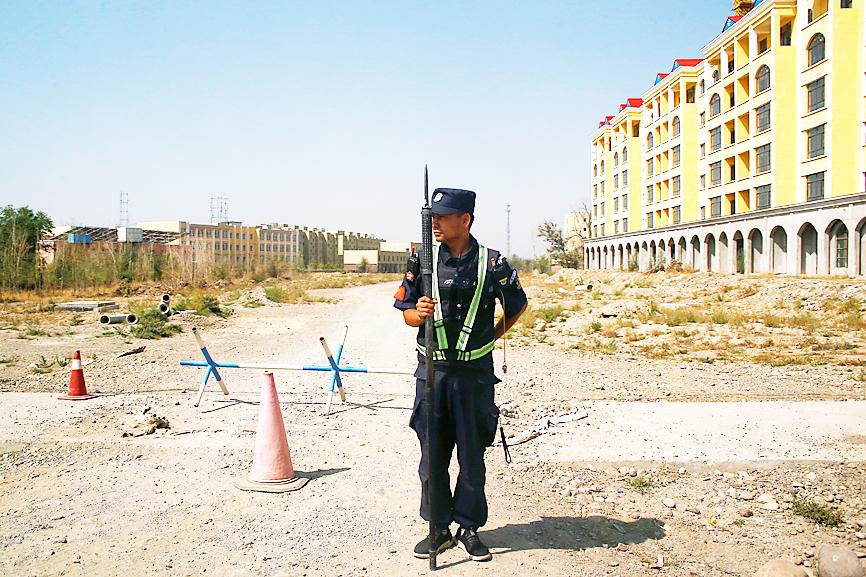Muslims in China’s Xinjiang were “arbitrarily” selected for arrest by a computer program that flagged suspicious behavior, rights campaigners said yesterday, in a report detailing big data’s role in repression in the restive region.
The US-based Human Rights Watch (HRW) said leaked police data that listed more than 2,000 detainees from the Aksu Prefecture was further evidence of “how China’s brutal repression of Xinjiang’s Turkic Muslims is being turbocharged by technology.”
Beijing has come under intense international criticism over its policies in the resource-rich territory, where rights groups say as many as 1 million Uighurs and other mostly Muslim minorities have been held in internment camps.

Photo: Reuters
China defends the facilities as vocational training centers aimed at stamping out terrorism and improving employment opportunities.
Surveillance spending in Xinjiang has ballooned in the past few years, with facial recognition, iris scanners, DNA collection and artificial intelligence deployed across the region in the name of preventing terrorism.
HRW said it had obtained the list — which detailed detentions from mid-2016 to late 2018 — from an anonymous source that had previously provided audiovisual content taken from inside a facility in Aksu.
The group gave an example of a “Mrs T” — detained for “links with sensitive countries” — who was listed as having received a number of calls from a foreign number that belonged to her sister.
HRW researchers spoke to the woman and learned that police had interrogated her sister in Xinjiang, but she has had no direct contact with her family in the region since.
The people were flagged using a program called the Integrated Joint Operations Platform, which collected data from surveillance systems in Xinjiang, before officials decided whether to send them to camps, HRW said.
The group said its research suggests the “vast majority” of people were flagged to authorities for legal behavior, including phone calls to relatives abroad, having no fixed address or switching off their phone repeatedly.
Only about 10 percent of the people on the list were detained for terrorism or extremism.
The list, parts of which were shown to reporters, described the reason for detention of many of the people as simply being “flagged” by the integrated platform.
HRW has not published the full contents of the list, citing safety concerns for the whistle-blower.
Chinese Ministry of Foreign Affairs spokesman Zhao Lijian (趙立堅) yesterday accused HRW of “stirring up trouble,” saying the report was “not worth refuting.”
Separately, US-based surveillance research firm IPVM said in a report on Tuesday that Chinese telecoms giant Huawei Technologies Co (華為) had been involved in testing facial recognition software that could send alerts to police when it recognized Uighur minorities’ faces.
An internal Huawei report cited by IPVM — which has been removed from the company’s Website, but is still visible in Google searches — showed the software as passing tests for “Uighur alerts” and “recognition based on age, sex, ethnicity, angle of facial images.”
Huawei yesterday said that the program “has not seen real-world application” and that it “only supplies general-purpose products for this kind of testing.”

INVESTIGATION: The case is the latest instance of a DPP figure being implicated in an espionage network accused of allegedly leaking information to Chinese intelligence Democratic Progressive Party (DPP) member Ho Jen-chieh (何仁傑) was detained and held incommunicado yesterday on suspicion of spying for China during his tenure as assistant to then-minister of foreign affairs Joseph Wu (吳釗燮). The Taipei District Prosecutors’ Office said Ho was implicated during its investigation into alleged spying activities by former Presidential Office consultant Wu Shang-yu (吳尚雨). Prosecutors said there is reason to believe Ho breached the National Security Act (國家安全法) by leaking classified Ministry of Foreign Affairs information to Chinese intelligence. Following interrogation, prosecutors petitioned the Taipei District Court to detain Ho, citing concerns over potential collusion or tampering of evidence. The

Seventy percent of middle and elementary schools now conduct English classes entirely in English, the Ministry of Education said, as it encourages schools nationwide to adopt this practice Minister of Education (MOE) Cheng Ying-yao (鄭英耀) is scheduled to present a report on the government’s bilingual education policy to the Legislative Yuan’s Education and Culture Committee today. The report would outline strategies aimed at expanding access to education, reducing regional disparities and improving talent cultivation. Implementation of bilingual education policies has varied across local governments, occasionally drawing public criticism. For example, some schools have required teachers of non-English subjects to pass English proficiency

NEGOTIATIONS: The US response to the countermeasures and plans Taiwan presented has been positive, including boosting procurement and investment, the president said Taiwan is included in the first group for trade negotiations with the US, President William Lai (賴清德) said yesterday, as he seeks to shield Taiwanese exporters from a 32 percent tariff. In Washington, US Trade Representative Jamieson Greer said in an interview on Fox News on Thursday that he would speak to his Taiwanese and Israeli counterparts yesterday about tariffs after holding a long discussion with the Vietnamese earlier. US President Donald Trump on Wednesday postponed punishing levies on multiple trade partners, including Taiwan, for three months after trillions of US dollars were wiped off global markets. He has maintained a 10 percent

TRADE: The premier pledged safeguards on ‘Made in Taiwan’ labeling, anti-dumping measures and stricter export controls to strengthen its position in trade talks Products labeled “made in Taiwan” must be genuinely made in Taiwan, Premier Cho Jung-tai (卓榮泰) said yesterday, vowing to enforce strict safeguards against “origin laundering” and initiate anti-dumping investigations to prevent China dumping its products in Taiwan. Cho made the remarks in a discussion session with representatives from industries in Kaohsiung. In response to the US government’s recent announcement of “reciprocal” tariffs on its trading partners, President William Lai (賴清德) and Cho last week began a series of consultations with industry leaders nationwide to gather feedback and address concerns. Taiwanese and US officials held a videoconference on Friday evening to discuss the